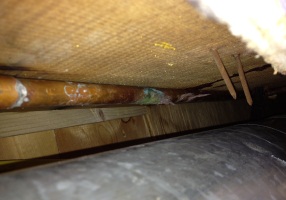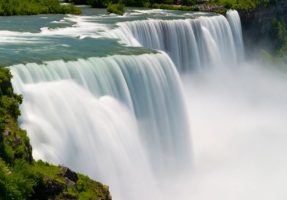A Frozen Pipe can Create a Stunning Water Feature
by Nicky DeBolt
December 28th, 2013

Although I would have loved to have taken a photo of the breath-taking waterfall jetting from the vinyl siding of our house, I decided to dive underneath our stairway and turn off the main water line. I had anticipated the break in the copper line the night before when my wife noticed that the cold water was not running from our kitchen faucet. It's one of those moments that you wish you weren't a Colorado home inspector. I knew the copper line had frozen somewhere between our utility room and the kitchen inlet valve, but was hopeful that I could reverse the frozen pipe with my almighty space heaters! Not the most effective idea, but it was late at night. With three space heaters running on high and the cold faucet set to the on position, we went to bed.
We have a Centennial home that was built in the 1970's. Like most of the homes built in Centennial-South Suburban area, the builders thought it was a good idea to run water lines up exterior walls. The copper lines are not insulated and Centennial homes built between 1960 and late 1970 have barely any exterior wall insulation. It is common to only find 2" to 3 1/2" fiberglass batts on older Centennial homes. This current insulation will supply a mere R-6 to R-11 total R-value. If you don't know anything about R-value, it would be like going outside during a cold Colorado winter night wearing a long sleeve cotton shirt. You wouldn't get cold immediately, but you would eventually freeze to death.
What do I do if I know a pipe is frozen? Well, similar to my circumstances, there isn't much you can do. Especially if you don't have physical access to the frozen pipe area. Here are a few things you can do if you suspect you have a frozen pipe:
1. Turn the faucet on and keep it on. If your thawing strategies work, you will want the water flow to avoid refreezing.
2. Do your best to investigate where the frozen pipe may be located and apply heat to that area. If you have physical access to the frozen section, you can use a heating pad, blow dryer, warm towels, or a space heater to thaw the area. In my case, I did not have access to the area so I used space heaters underneath the kitchen sink and the utility room (basement room underneath kitchen sink).
3. Lastly, call a qualified plumber. This is probably the smartest move to avoid damage to your interior or exterior.
 Credit: CaptainIFR/iStockphoto.com
Credit: CaptainIFR/iStockphoto.com
How do I prevent frozen pipes? Taking preventative steps to avoid coming home to Niagara Falls is the best answer.
1. Walk around your house looking for exposed water lines. Check the attic, basement, crawlspace, garage, under all your sinks, and any other area where the water lines are not in a heated space. Your hot and cold water lines should be insulated.
2. During freezing temperatures outside, open the cabinet doors of your kitchen and bathroom sinks to allow the heat from the room to enter and warm the plumbing.
3. Again, when temperatures outside are extreme, let the cold water slowly drip. Personally, I wouldn't slow drip all my faucets, but I would pay attention to any sinks that are against an external wall.
4. Keep the thermostat at a consistent temperature day and night. This is something I would recommend during those freezing temperature streaks we have in Colorado.
5. Install or add appropriate insulation to your attic, crawlspaces, basements, and in some cases the exterior walls. Generally in Colorado, depending on what county you live in, you want to have a minimum of R-38 in the attic, R-13 in crawlspaces and basements, and R-19 in exterior walls.
I'll give you the quick ending to our busted pipe story. After I turned off the main water line, I literally punched a couple of holes down in the utility room's ceiling and found the cold water line leading up to the kitchen faucet. I broke out my trusty Sawzall reciprocating saw, cut the copper pipe, and capped it with a Sharkbite connection. I then called my insurance company. 8)
More Home Inspection Posts
How to get more from your Home Inspection for Free- 3 tips
"Fire!" Don't Worry, Smoke Alarms to the Rescue!"
"The Ultimate Definition of a Home Inspection"






